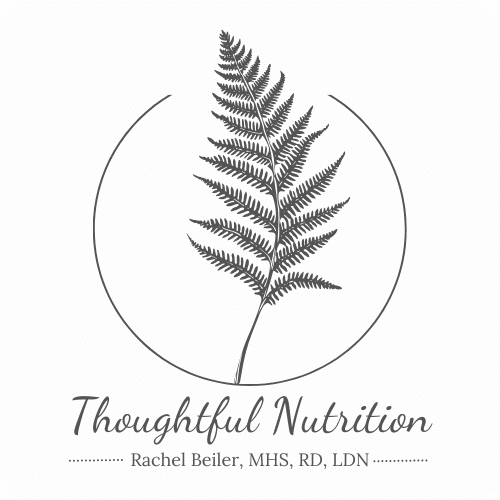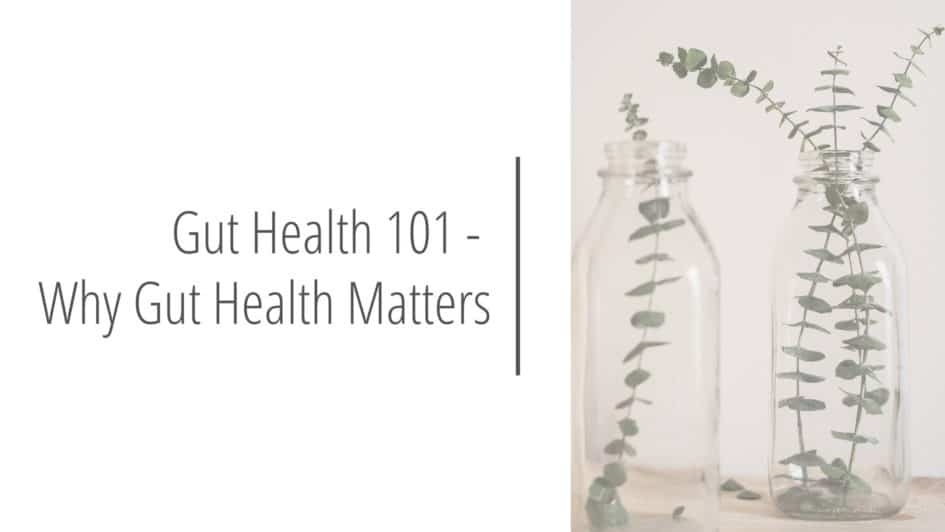Table of Contents
Gut Health 101
Gut health 101 is different than my usual topics of Intuitive Eating, Health at Every Size (HAES), body positivity, and all things anti-diet. However, it can actually play an important role in these topics. Keep reading to find out how!
Why Gut Health is Important
It wouldn’t be a gut health 101 article without first discussing why gut health is important.
Functions of the Gut
The gut is home to over 40 trillion beneficial organisms that help the body in countless ways. These organisms, also known as microbes, aid in:
- Digestion
- Synthesis of essential nutrients (vitamins/minerals)
- Protection from disease
- DNA synthesis
- Regulation of appetite
- Metabolism
- Neurological function
- And more!
The Gut-Brain Connection
Have you ever heard of the gut-brain connection? This connection emphasizes why gut health matters.
The body has what is called the enteric nervous system (ENS), which is one of the main divisions of the autonomic nervous system (ANS). The ENS is what dictates the function of the gastrointestinal tract (GI tract) and plays a big role in the gut-brain connection. Some examples of this connection include when stress/nervousness/anxiety causes an upset stomach or when the thought of food releases digestive juices into the stomach.
Did you know that a large portion of the body’s serotonin is produced in the gut? Inadequate production of serotonin, a type of neurotransmitter, can lead to depression, low energy, negative thoughts, irritability, anxiety, and more.
The gut also produces other neurotransmitters including dopamine and GABA, which play a key role in determining mood. On top of this, gut health may factor into the risk of developing neuropsychiatric illnesses like ADHD, OCD, and chronic fatigue syndrome.
With all of that said, it’s easy to understand why gut health matters. Not only does our gut keep us healthy by synthesizing nutrients and protecting us from disease, but gut health is scientifically proven to impact our mood.
That means that gut health can play a role in eating disorders, body dysmorphia, eating intuitively, mental health, self-love, body image acceptance, and so much more! The gut-brain connection is what connects gut health to the topics I typically discuss.
How to Take Care of the Gut
So how exactly do we take good care of the gut? There are 3 easy ways to approach it.
1. Feed the good bacteria
The GI tract is home to trillions of beneficial bacteria. These bacteria, as noted earlier, take care of our bodies in countless ways. One great way to take care of these bacteria is to feed them. That sounds kind of weird, right? But it’s important.
We can feed them by eating prebiotics, which are plant fibers. Prebiotics are a type of fiber that the human body cannot digest, but the bacteria in the GI tract can. Examples of foods that are good sources of prebiotics include bananas, oats, apples, flaxseed, onion, garlic, asparagus, and other fiber-rich foods.
2. Don’t kill the good bacteria
It is so important to not kill the good bacteria living in the gut. The most well-known killer of gut bacteria is antibiotics, which are commonly used today. Other killers include:
- Smoking
- Excessive alcohol intake
- Environmental toxins/pollutants
- Stress
3. Eat the good ones
One of my favorite words is PROBIOTICS. Probiotics are living bacteria and yeast that are similar to the microbes in the GI tract. They are beneficial for the body, especially the gut. Here are some great examples:
- Yogurt with active, live cultures
- Kefir
- Some cheeses, like ricotta
- Fermented foods, like kimchi, sauerkraut, and tempeh
- Kombucha
Gut Health 101 – A Quick Summary
The gut is home to over 40 trillion beneficial organisms, also known as microbes. These microbes help the body with digestion, synthesis of vitamins and minerals, metabolism, and much more.
The gut-brain connection helps emphasize why gut health matters. This connection is scientifically proven to impact our mood as the gut helps produce serotonin, dopamine, and other important neurotransmitters.
There are 3 easy ways to take care of the gut:
- Feed the good bacteria by eating foods rich in prebiotics
- Don’t kill the good bacteria by minimizing antibiotic use, smoking, and excessive alcohol intake
- Eat the good bacteria by consuming probiotic rich foods
Thanks for reading!
Rachel Beiler, MHS, RD, LDN


3 Pingbacks